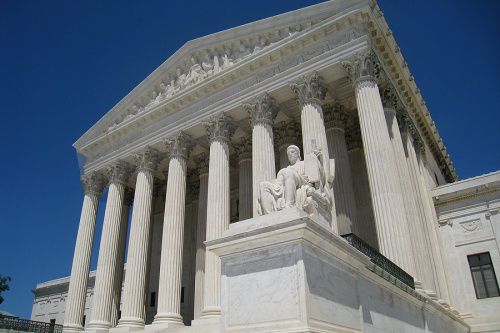As the U.S. Supreme Court prepares to deliver a ruling that could lead to sweeping changes in the definition of marriage nationwide, two states have enacted new legal protections for those with religious objections to recognizing same-sex ‘marriages.’ “It’s important that people not feel as though they have to check their faith at the door,” a spokesman for the Diocese of Raleigh, N.C., told CNA. A new law in North Carolina allows state magistrates to opt out of performing all civil marriages if they establish a “sincerely held religious objection” to doing so. The law comes after a top court administrator said in a memo that those who declined to serve as marriage officials for same-sex couples could be punished, terminated or face legal charges, the ABC television affiliate WTVD reports. Meanwhile, new Michigan laws protect the religious freedom of adoption agencies that for place children only with a mother and a father. The laws say that any agency refusing to place children in a certain instance must inform clients of other agencies that could fulfill their request. Michigan Gov. Rick Snyder signed the adoption laws June 11. “The state has made significant progress in finding more ‘forever homes’ for Michigan kids in recent years and that wouldn’t be possible without the public-private partnerships that facilitate the adoption process,” he explained. The Michigan Catholic Conference called the laws “critically important” to maintain the state’s “long-standing partnership” with religious adoption agencies. There are currently more than 100 total adoption agencies in the state of Michigan. Catholic Charities of Southeast Michigan alone served over 400 children in its adoption and foster care programs in 2013, according to the agency’s website. The Michigan Catholic Conference said the adoption bills are a victory against discrimination, saying that they “will ensure the state does not discriminate against social service agencies that serve the poor and vulnerable while providing foster care and adoption services to the general public.” The governors of Michigan and North Carolina are both Republican, but they took different stances on the bills. On the same day Gov. Snyder signed the Michigan bills into law, the North Carolina state house successfully overrode Gov. Pat McCrory’s veto of Senate Bill 2 to protect state magistrates with objections to conducting same-sex “marriages.” The state legislation comes shortly before the U.S. Supreme Court is expected to rule whether there is a federal right to same-sex “marriage.” If such a right is recognized by the court, persons and organizations with religious and moral objections to recognizing same-sex unions could become more vulnerable to lawsuits and other discrimination charges. Catholic adoption agencies in Massachusetts, the District of Columbia and Illinois that could not in good conscience place children with same-sex couples have already been forced to close by law or by the denial of government funding. Their policies ran afoul of local anti-discrimination laws and growing demands that all institutions and individuals approve of state-recognized same-sex unions. The American Civil Liberties Union criticized the Michigan and North Carolina laws, deeming them “two stains on our nation.” Religious freedom questions were raised during Supreme Court arguments on the future of civil marriage. During the April 28 oral arguments before the Supreme Court in the marriage case Obergefell v. Hodges, U.S. Solicitor General Donald Verilli admitted the possibility of a religious freedom conflict if the Court rules in favor of same-sex ‘marriage.’ Verilli, who argued in favor of redefining marriage on behalf of the Obama administration, also admitted the high court’s approval of a legal right to same-sex “marriage” would mean problems for the tax-exempt status of colleges with objections to recognizing the unions.

